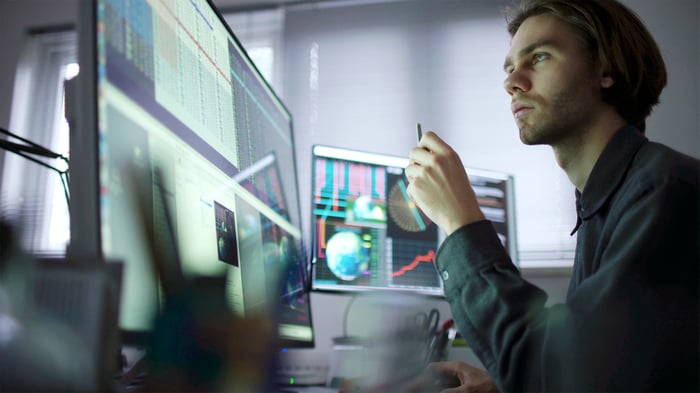What a difference a year makes. In December, Wall Street ended its worst year since the Great Recession of 2008. Eight months later, the economic clouds have dissipated. All three of the major market indexes have rebounded more than 20% since their recent lows, with some market watchers heralding the beginning of the next bull market.
What helped fuel this reversal? There are several potential reasons, but many analysts will point to recent advancements in the field of artificial intelligence (AI). The debut of ChatGPT late last year showcased the wide-ranging potential of generative AI, which has since acted as a big catalyst to drive the market higher.
Considering the big runup over the past year, some analysts fear the rally has gotten ahead of itself. Billionaire Daniel Loeb isn't one of them. He sees these developments as "transformational," and believes a "profound economic upheaval" is underway. While many stocks could benefit from the AI arms race, Loeb highlights three stocks he calls "picks and shovels" in his second-quarter letter to investors earlier this month.

Image source: Getty Images.
Loeb has the ear of Wall Street
Daniel Loeb is something of a legendary figure on Wall Street. He's CEO of Third Point, a hedge fund he founded in 1995, parlaying $3 million in starting capital into a $6 billion financial empire.
Loeb made a name for himself taking big swings. One of the most notable was a high-profile proxy fight with Yahoo! in 2011. The activist investor had acquired a 5% stake in the beleaguered web services provider. After agitating for change, pushing out the CEO, and getting concessions from the board, Loeb sold his stake, banking more than $1 billion in profit in the process.
So, when Loeb talks, Wall Street tends to listen.
Loeb highlighted two watershed events in the past year
In Third Point's second-quarter investor letter, Loeb took great pains to lay out the case for AI, writing that the technology "will have far-reaching effects" and comparing it to the introduction of the PC in the 1980s, internet in the 1990s, mobile devices in the 2000s, and cloud computing in the 2010s.
"We believe generative and other forms of AI could compare to the industrial revolution, but compressed into a period of months and years rather than decades," Loeb said. He cites two "watershed events" as indicators of what's already happening.
First was Nvidia's (NVDA -0.79%) first-quarter financial report, which included an "astronomical earnings beat and forward guidance," he explained. It was the guidance that really raised eyebrows, calling for 64% year-over-year growth and 53% sequentially. This was the first sure sign that the AI revolution was well and truly underway, as Nvidia supplies the semiconductors that are the gold standard for AI systems.
Second, Loeb cited a recent announcement by Microsoft (MSFT 0.11%) regarding the initial pricing for its generative AI-laden software tools. The company said it will charge $30 per user per month for its Microsoft 365 Copilot, which Loeb believes "could increase revenues by as much as $25 billion or more in software sales alone."
Big uptick in cloud computing
Among the biggest beneficiaries of this AI revolution, according to Loeb, will be the big three cloud infrastructure providers: Amazon (AMZN -1.61%) Web Services, Microsoft Azure, and Alphabet's (GOOGL 0.23%) (GOOG 0.23%) Google Cloud.
Loeb argues that the "most direct consequence" of mainstream adoption of the large language models (LLM) that underlie generative AI is that it will "drive faster revenue growth for the three hyperscale cloud providers." He points out that "LLMs require cloud-scale data storage and compute resources," while noting that many of these systems will be available exclusively via these cloud services. He further states that "Microsoft, Amazon, and Google are the 'picks and shovels' of the AI gold rush" and will benefit no matter who else wins.
Loeb is, of course, referring to the famous quote attributed to Mark Twain: "During the gold rush, it's a good time to be in the pick-and-shovel business." In this case, AI is the gold rush, and Amazon, Microsoft, and Alphabet are the picks-and-shovels businesses.
The usual caveats
As the past couple of years reminds us, corrections and bear markets are part of the cost of admission for being an investor, and we never know when stocks will fall -- so investors should keep their sights set firmly on the long term.
Furthermore, none of these companies is the screaming bargain they were just months ago. Microsoft, Alphabet, and Amazon stocks currently sell for 12 times, 6 times, and 3 times sales, respectively. However, valuations should never be viewed in a vacuum, and I'd argue that each stock is a worthwhile investment -- even at its current price. The secular tailwinds alone could account for their somewhat lofty valuations.
If Loeb is right -- and I wholeheartedly believe that he is -- each of these stocks could generate a great deal of upside over the coming decade. While their valuations might seem stretched, the disruptive potential of AI could quickly help them grow into their multiples by driving a significant increase in both sales and profits and fueling a rally that could run for years.





